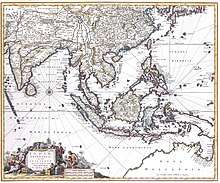
Back حقبة الديمقراطية الليبرالية في إندونيسيا Arabic Kera'yatan Liberal BEW Démocratie libérale en Indonésie French Era Demokrasi Liberal (1950–1959) ID 인도네시아 자유민주주의 시대 Korean Либеральная демократия (Индонезия) Russian
| Indonesian Liberal Democracy era | |||
|---|---|---|---|
| 1950–1959 | |||
 Billboards promoting political parties for the 1955 general elections. | |||
| Location | Indonesia | ||
| Leader(s) | Sukarno | ||
| Key events | |||
Chronology
| |||
| History of Indonesia |
|---|
 |
| Timeline |
|
|
The Liberal Democracy period in Indonesia (Indonesian: Demokrasi Liberal), also known as the Era of Parliamentary Democracy, was a period in Indonesian political history, when the country was under a liberal democratic system. During this period, Indonesia held its first and only free and fair legislative election until 1999, but also saw continual political instability. The period began on 17 August 1950 following the dissolution of the federal United States of Indonesia, less than a year after its formation, and ended with the imposition of martial law and President Sukarno's decree, which resulted in the introduction of the Guided Democracy period on 5 July 1959.
On 17 August 1950, the Republic of the United States of Indonesia (RIS), which was a state created as a result of the Round Table Conference and the recognition of Indonesian sovereignty by the Netherlands, was officially dissolved. The system of government was also changed to a parliamentary democracy based on the Provisional Constitution of 1950.
The period of liberal democracy was marked by the growth of political parties and the enactment of a parliamentary system of government, but also by a long period of political instability, with governments falling one after another. The 1955 legislative elections saw the first free and fair elections in Indonesian history, as well as the only free and fair election until the 1999 legislative elections, which were held at the end of the New Order regime.[1]